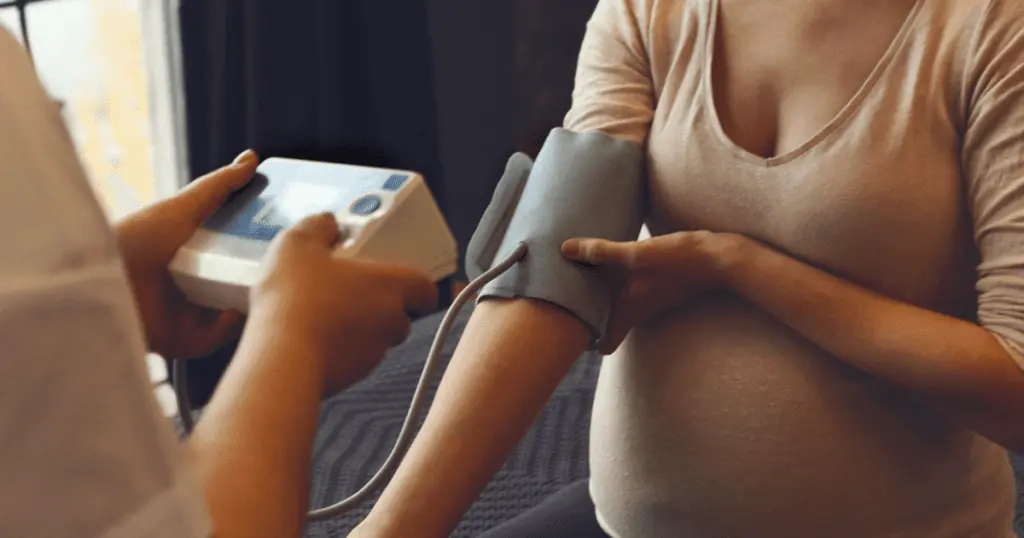What is Preeclampsia?

Preeclampsia is a complication that happens in about 1 in 25 pregnancies in the United States. While it’s a serious condition, it’s important to remember that with proper care and monitoring, many women with preeclampsia can still have a healthy and safe birth.
So, what is preeclampsia?
Preeclampsia is a condition that typically develops after 20 weeks of pregnancy. People with preeclampsia experience high blood pressure (also called hypertension.) High blood pressure can cause stress to your heart and other problems during pregnancy. If left untreated, preeclampsia can cause damage to your liver and kidney. It can also affect the blood flow to the placenta, which can impact fetal growth and development.
What are the symptoms?
The physical symptoms can vary, but some common signs include:
- high blood pressure
- protein in the urine
- severe headaches
- visual disturbances
- sudden weight gain
- swelling in the face and hands
It’s important to note that not all women with preeclampsia will experience noticeable symptoms. This is why regular prenatal care and monitoring is important.
How is preeclampsia diagnosed?
Preeclampsia is typically diagnosed through regular prenatal checkups. Your healthcare provider will monitor your blood pressure and check for any signs of protein in your urine. They may also perform additional tests, such as blood work or ultrasounds, to assess your overall health and the health of your baby.
How is it treated?
If you are diagnosed with preeclampsia, it’s important to receive proper treatment to manage the condition and prevent complications. The specific treatment plan will depend on the severity of your symptoms and the stage of your pregnancy.
If you are near your due date, your doctor may recommend inducing labor or performing a cesarean. This is because delivery is the only cure for preeclampsia. The longer the condition goes untreated, the higher the risk of serious complications for both you and your baby.
If you are not yet near your due date, your doctor may recommend close monitoring and bed rest to manage your symptoms and prevent further complications. Your doctor may also prescribe medication to lower your blood pressure and prevent seizures, which can be a potential complication of severe preeclampsia, known as eclampsia.
In some cases, your doctor may also recommend hospitalization for closer monitoring and management of your symptoms. This may include regular blood pressure checks, urine tests to monitor for protein, and fetal monitoring to assess your baby’s health.
Can I do anything to prevent preeclampsia?
Unfortunately, there is no guaranteed way to prevent preeclampsia. However, there are some steps you can take to lower your risk:
- Attend regular prenatal checkups. Prenatal care is essential to monitor your blood pressure, urine protein levels, and other health indicators that can indicate the development of preeclampsia.
- Stay healthy and active. Eating a balanced diet and staying physically active throughout your pregnancy can help reduce your risk of developing preeclampsia.
- Manage chronic health conditions. If you have pre-existing medical conditions like hypertension or diabetes, work closely with your healthcare provider to manage these conditions during your pregnancy.
If you are concerned about your risk of developing preeclampsia, talk to your healthcare provider. They can help you develop a plan to manage your risk and monitor your health throughout your pregnancy. Early detection and treatment is necessary to ensure a safe and healthy pregnancy and birth for you and your baby.
Each person’s experience may be different. Your care provider will develop a treatment plan that is tailored to your individual needs. Your doulas are here to support you throughout your pregnancy and birth journey, including during any complications that may arise. They can provide emotional support, help you understand your treatment options, and help you advocate for your needs and preferences with your healthcare team. With the right care and support, most women with preeclampsia can still have a safe and positive birth experience.
